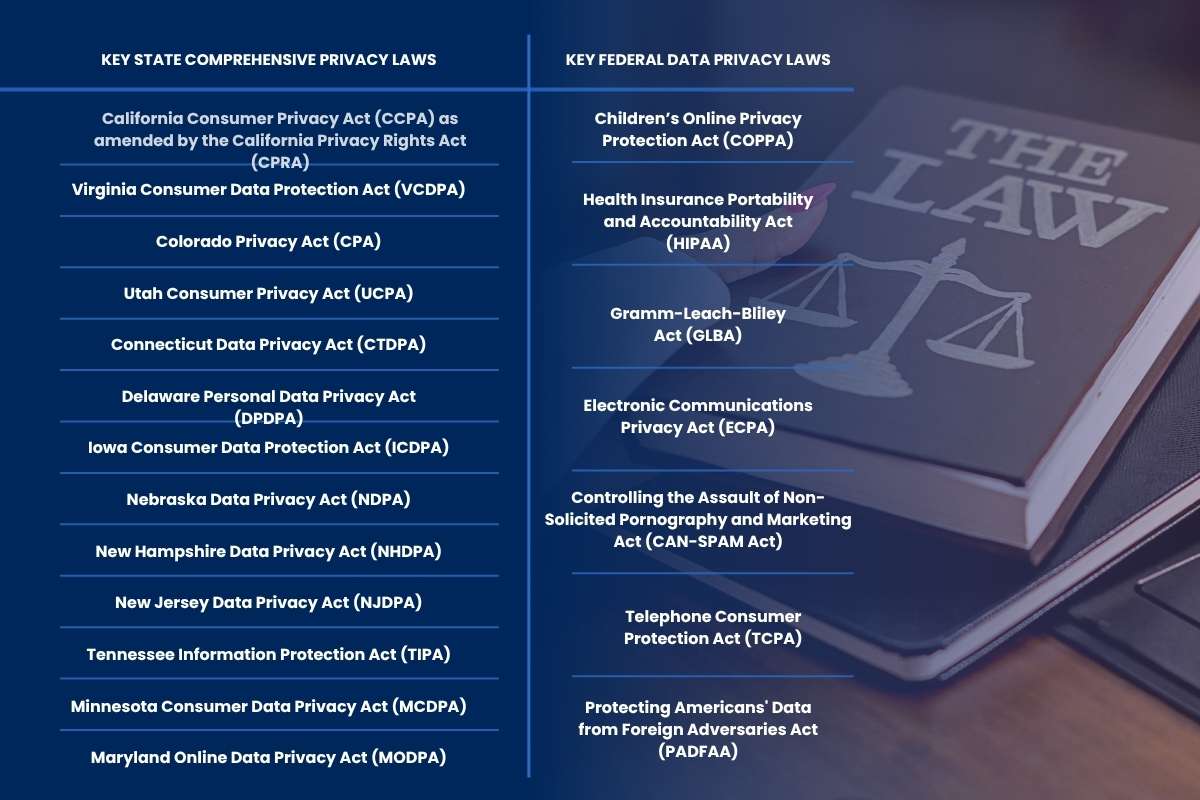How Well Do You Know Data Privacy Laws? Think Again!
How Well Do You Know Data Privacy Laws? Think Again!
Blog Article
How Well Do You Know Data Privacy Laws? Think Again!
In a world driven by data, every digital interaction leaves a trace, and protecting that trace is more important than ever. Data privacy laws in 2025 serve as the backbone of digital trust, empowering individuals, holding organizations accountable, and ensuring technology advances ethically and securely.

- Source: putilich
Every click, every sale, and every pic, or whatever you share, produces a digital footprint. Today, our data is coming together through many means, collected and processed, and sometimes monetized in a manner that most of us do not understand. Have you ever thought about who owns your digital identity, or for that matter, what measures are in place to keep your most confidential information from leaving your control?
As more digital space is created, it becomes increasingly more important to consider how we can protect ourselves. This is a complex juggle between technological advancement and the rights of individuals.
The foundation of trust rests on how we handle our data. This has led to the creation of Data Privacy Laws. So, let’s learn more about how these laws can be saviours in this digital world.
What are Data Privacy Laws? Importance in 2025
These privacy laws are legislative frameworks designed to manage how personal information is collected, stored, processed, and shared by organizations. These laws allow individuals greater control over their digital footprint, establishing rights such as the ability to access, correct, or delete their data, and demanding transparency from entities handling their information. They basically create a legal base for digital trust, ensuring that while businesses utilize data, they do so responsibly and ethically.
In 2025, the importance of these laws will be vital. We live in an era of extraordinary data collection, powered by advanced technologies like AI and the universal digital transformation across all sectors. These laws are essential for:
1. Protecting Individual Rights:
They safeguard fundamental rights like privacy, preventing misuse, discrimination, and exploitation of personal information.
2. Building Trust:

3. Fostering Responsible Innovation:
By setting clear boundaries, these laws guide companies towards ethical data practices, encouraging innovation that respects privacy rather than disregards it.
4. Ensuring Accountability:
They hold organizations accountable for data handling, imposing significant penalties for non-compliance, thereby incentivizing adherence to privacy principles.
5. Navigating through the Digital World:
With cross-border data flows and evolving technologies, harmonized or at least compatible. Data privacy laws are essential to ensure consistent protection and enable global commerce.
List of Data Privacy Laws in 2025:

Key State Comprehensive Privacy Laws:
1. California Consumer Privacy Act (CCPA) as amended by the California Privacy Rights Act (CPRA):
Already in effect, the CPRA considerably expanded the CCPA, creating the California Privacy Protection Agency (CPPA) for enforcement, adding sensitive personal information, and strengthening consumer rights around data sales and sharing for cross-context behavioral advertising.
2. Virginia Consumer Data Protection Act (VCDPA):
Also already in effect, similar to CCPA in granting consumer rights.
3. Colorado Privacy Act (CPA):
In effect, another complete state law.
4. Utah Consumer Privacy Act (UCPA):
In effect, generally seen as more business-friendly than some other state laws.
5. Connecticut Data Privacy Act (CTDPA):
In effect, it aligns closely with VCDPA and CPA.
6. Delaware Personal Data Privacy Act (DPDPA):
Effective January 1, 2025. Noteworthy for its strong consumer rights and potentially lower thresholds for applicability for businesses that process sensitive data.
7. Iowa Consumer Data Protection Act (ICDPA):
Effective January 1, 2025.
8. Nebraska Data Privacy Act (NDPA):
Effective January 1, 2025.
9. New Hampshire Data Privacy Act (NHDPA):
Effective January 1, 2025.
10. New Jersey Data Privacy Act (NJDPA):
Effective January 15, 2025. Different for having no revenue threshold for applicability if a business sells personal data of a certain number of consumers.
11. Tennessee Information Protection Act (TIPA):
Effective July 1, 2025.
12. Minnesota Consumer Data Privacy Act (MCDPA):
Effective July 31, 2025. Includes unique provisions around profiling and children’s data.
13. Maryland Online Data Privacy Act (MODPA):
Effective October 1, 2025. This law stands out for its stricter data minimization requirements and broad definition of sensitive data, including a complete ban on the sale of sensitive data.
Key Federal Data Privacy Laws:
1. Children’s Online Privacy Protection Act (COPPA):
Regulates the online collection of personal information from children under 13. Important updates to COPPA were finalized in January 2025, including more specific parental consent requirements for targeted advertising or disclosure of children’s data to third parties.
2. Health Insurance Portability and Accountability Act (HIPAA):
Governs the privacy and security of protected health information (PHI) by healthcare providers, health plans, and healthcare clearinghouses, and their business associates.
3. Gramm-Leach-Bliley Act (GLBA):
Requires financial institutions to explain their information-sharing practices to their customers and to safeguard sensitive data.
4. Electronic Communications Privacy Act (ECPA):
Protects electronic communications from unauthorized interception or access.
5. Controlling the Assault of Non-Solicited Pornography and Marketing Act (CAN-SPAM Act):
Sets rules for commercial email, giving recipients the right to have emails stopped.
6. Telephone Consumer Protection Act (TCPA):
Restricts telemarketing calls and the use of automatic telephone dialing systems and artificial or prerecorded voice messages.
7. Protecting Americans’ Data from Foreign Adversaries Act (PADFAA):
Enacted in 2024, it prohibits data brokers from transferring Americans’ sensitive personal data to certain foreign countries. This is increasingly relevant in 2025.
Case Study Summary: Data Privacy Laws in the Age of Educational Apps

This situation highlights a growing concern in education: how to balance instructional innovation with compliance with data privacy laws like FERPA and COPPA. These laws require districts to maintain control over student data and ensure vendors handle it responsibly. Yet, with distributed decision-making and limited resources, many districts struggle to review each app thoroughly.
To bridge this gap, best practices now include providing teachers with privacy checklists, obtaining parental consent, reviewing Terms of Service (TOS), and maintaining transparency about what apps are in use. Importantly, even seemingly harmless data like student names and emails can fall under FERPA if linked to learning data.
This case underscores a vital lesson: data privacy laws aren’t just legal red tape; they’re essential guardrails for protecting students in an increasingly digital classroom. School districts must find smart, proactive ways to support teachers while ensuring compliance and student safety.
Source: https://nces.ed.gov/forum/pdf/CaseStudies_dp.pdf
Conclusion:
As our lives become even more tangled with the digital world, the importance of safeguarding our personal information only increases. From the smallest online interaction to the vast datasets powering AI, our digital footprints are constantly expanding.
It’s clear that Data Privacy Laws aren’t just a regulatory burden; they are the essential guardians of our rights and the base of trust in the digital economy. They empower us to reclaim control over our data, hold organizations accountable, and ensure that technological advancement marches forward hand-in-hand with ethical responsibility.
Navigating this changing legal world is complex, but understanding and upholding these laws is vital for businesses and individuals alike to thrive securely in 2025 and beyond.
FAQ:
1. What is an example of a data privacy laws?
Businesses cannot disclose certain sensitive information, such as your social security number, financial account number, or account passwords, but they must tell you if they’re collecting that type of information.
2. What is an example of a data breach in Ireland?
The data of 37,000 Eir customers – Ireland’s largest telecom provider – were hit by the data breach. Although Eir insists no financial data was exposed, the device did contain details of customers’ names, numbers, email addresses, and Eir account numbers.
3. What are the three C’s of data literacy?
The 3 C’s of Data Literacy are curiosity, creativity, and critical thinking, according to Jordan Morrow. Morrow explains, “Within the world of data and analytics, we get so caught up in the magnificence that is the data itself, the magnitude of it, and the power of the technology.
Also Read :-Safeguarding Your Digital World: The Role of a Cyber Crime Lawyer